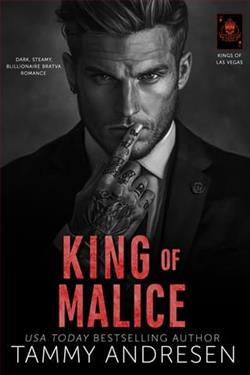Page 2 of The Quest for Excalibur
“Well,” I said, studying their faces. “Firstly, Archfedd is too young to go with just you two. You know that. And secondly, it’s late in the afternoon, and will be dark in no time at all. And that isnota good idea.” I met Amhar’s eyes, surprised to find relief in them. “So, no. You can stay within the fortress walls until supper. Perhaps if you can persuade Llacheu to take you, tomorrowmorning, then I’ll change my mind. But just you two boys– Archfedd should stay here.”
Archfedd’s face took on a mutinous expression, and she kicked her boot against the table leg.
Medraut stuck out his lower lip, more daring than she was. “It won’t be his birthday celebration tomorrow morning. My uncle theKingwould let us go.”
I sighed. “Not at this time of the day. And the King is not here. While he’s away,Iam the one in charge.”
A scowl settled on his heavy brows. “Motherwould let me go.”
Oh dear. How to deal with this. I had to remember that Medraut was still a child, even though he’d grown so large, and a child who must be missing his mother. Almost impossible, when all I could think whenever I looked at him was that he might one day bring death to my husband. If the legends I knew were correct.
“Your mother isn’t here either,” I said, frostiness creeping into my voice no matter how hard I tried to keep it out. “She left you in my care, so you’re subject to my control, just as Amhar and Archfedd are. And I doubt very much that she would have let you go wandering about outside Din Cadan by yourself at this time on a winter’s afternoon, with darkness not far off.”
Undaunted, he tried again. “It’s not wandering– it’s a party. Myfatherwould have let me go. Letusgo.”
This I couldn’t argue. Probably Theodoric would indeed have allowed his son to do just as he wished, even at only twelve years old, but Theodoric was not here. He was back at Caerleon, if he had any sense, and if he didn’t, which seemed more than likely, he was riding out the winter storms in one of his ships in the middle of the Irish Sea.
I forced a smile. “You’re probably right there, but I have the final say, and I don’t like you arguing with me like this, Medraut. Look. Amhar and Archfedd don’t look unhappy at my decision. They know they have to do as they’re told.” I glanced at my own two children. “Why don’t all three of you go off and find Maia– she’s been baking your favorite honey cakes. You can tell her from me you’re all allowed two each. And tomorrow, you boys can take two to Amloch as a present. Off you go now. I have work to do and you’re disturbing me.”
Still grumbling to himself, but mollified by the offer of the honey cakes, Medraut departed with alacrity, probably worried I’d change my mind. Amhar and Archfedd hurried after him, the puppy bounding at their heels.
For a moment or two, I sat staring after them, distracted from my work. I couldn’t say I missed Theodoric, to whom I’d never warmed, and in all likelihood Medraut didn’t either, as he’d so infrequently seen his father, but I felt a pang of sadness for the boy.
His mother, Arthur’s youngest sister Morgawse, had decided, after a good many years spent here in Din Cadan, that her place lay at her husband’s side in the port where his fleet was based. Possibly due to Theo’s predeliction for other women. This sudden determination didn’t stretch as far as accompanying him to sea, of course, and in case he decided his only son should go with him on one of his almost piratical voyages, she’d elected to leave Medraut here in comparative safety.
“Training to become a warrior,” she said to me as she kissed me goodbye nine months previously, “is a far safer option for my son than going off in one of those leaky boats my husband’s so proud of. I know you’ll keep him safe for me, andI’llkeep his father away from him.”
I had mixed feelings about this, understandably. Part of me wanted Medraut where I could keep an eye on him, but another part, perhaps the wiser part, had wanted him gone from Din Cadan and away from my children. A third, fatalistic part, suspected that whatever happened, Medraut was already treading the path to the fateful day of Camlann, and that nothing I did could avert it. So, I smiled sweetly at my sister-in-law and assured her that I’d care for her son as though he were my own. While inside I shuddered at the thought.
A shiver ran through me, as though someone had walked over my grave. Which they might well have, back in my old world, as I’d be dry old bones by then. I pushed the unwelcome thought away and returned to my book.
Each page held a lot of information. I’d crammed the writing in, leaving only small margins, and not wasted space on illuminations, even though the abbot had pressed me to include them. There’d been a lot to squeeze in from the notes I’d taken on the thin wooden tablets that served as my everyday writing surfaces.
I turned to the first smooth, virgin page. Even as a child I’d loved the feel of a new sheet of paper to write on, although then it had been in school notebooks, not the laboriously prepared vellum that now lay before me. Made of almost translucent calfskin, it provided the most satisfying and beautiful surface to write on, and the weight of responsibility sat heavily on my shoulders as I picked up my pen again and dipped the tip into my inkpot.
The pen was a piece of narrow wood, rounded like a modern pencil, with a curve of thin metal coiled about it. Dipping it into the ink loaded the spiral like a small cartridge and would allow me to write several words without redipping the pen. However, using it was a hard skill to master, and every word I wrote had to be done with slow and careful precision. Oh, for a nice word processing program on a laptop– how easy would that have made my task. And what a surprise for archaeologists.
But of course, I didn’t have either program or laptop, so I had to make do with what lay before me and think myself lucky there was anything to write on at all.
At the top of the fresh blank page, I wrote a new title.The Battle of Tryfrwyd. In Latin. I could speak and understand it as though it were my native language, but more often our day-to-day conversations were in Brythonic Celtic. Something to do with how I’d got here enabled me to slip seamlessly from one language to the other. How odd that the words I wrote were not just Latin but probably early medieval Latin, and me quite unaware of my proficiency in it.
I dipped the pen into my ink pot and began to write.
Chapter Two
My pen scratchedacross the vellum. The monks had covered the pages with faint lines for me to follow, which kept my writing neat and straight, like the lined notebooks I’d had as a child.
The twelfth year of the reign of Arthur, called Pendragon, King of Dumnonia. The ninth year of his rule as High King of all Britain. Autumn came, and with it, fair weather. The corn stood thick and tall in the fields, and a plentiful hay crop had been brought in for winter. With the good weather, the Saxons of the east became brave and bold, perhaps seeking to seize our crops for their own winter provisions, for many of them are settled here, and never return to their homelands.
Their leader is one Aelle, uncle to Cerdic, king of Caer Guinntgwic, a town that lies some fifty miles east of Din Cadan, on the River Itchen. Cerdic attends the Council of Kings in Viroconium alongside the other British rulers, and has sworn fealty to the High King. Yet all must wonder where his true loyalties lie. His mother was Saxon born, a sister of Aelle. His father was a British king. He is a man with a foot in two camps.
This Aelle sailed his ships up the Tamesis River past the old city of Londinium where now no Briton dares set his foot. The Saxons hold much of the east, and Londinium is theirs. But they do not like to live in the ruins of the old Roman city. It is said they believe the wraiths of the past inhabitants still haunt the tumbled buildings, and they will not set foot inside the city walls for fear of what walks there. So, Londinium, “Caer Lundein” in our tongue, is a true ghost city, the ruins left for cur dogs and yowling cats, for specters and perhaps a few bands of the more desperate brigands.
The Saxons push continuously against our borders, edging westward at every opportunity. Already along the Tamesis, small settlements exist which past kings have tolerated, founded by the ancestors of those who till the fields there now. These were men invited into Britain by our departed Roman overlords, or perhaps by the Usurper, Vitelinus the Guorthegirn, himself. Yet even these have inched their way to greater territory, encroaching upon our native-born farmers, taking their women to wife, and this summer Aelle hoped to lead his men against Caer Celemion. This town, ruled by our ally, King Einion, has lately become a frontier fortress, lying as it does not far to the south of the great river. Strong stone walls encircle it, but these are long and difficult to defend.
Writing by hand for too long made my right arm ache, and this was a lengthy piece to commit to paper in one go, but I wanted to do it with the memory still fresh in my mind. I stretched and flexed my fingers. With this new narrative, I’d be almost up to date with my history, and I couldn’t help but feel a little smug. It had been a marathon undertaking. My fingers a little less stiff now, I dipped my pen into the inkpot once more.
King Einion, due to the proximity of Saxon settlements, had already wisely undertaken to block some of the gateways in his town of Caer Celemion, the better to defend its walls. This town sits amid the forest and heathlands to the south of the Rivers Kennet and Tamesis, and to the west of the River Loddon, and was once known as Calleva to the Romans.















